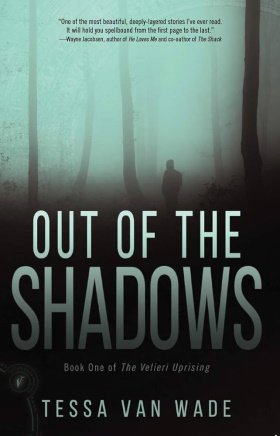After a moment, noises seem to be everywhere—phones, people, babies, coughing. He turns left to right. “Can someone help me?” He is aggressive and every bit of his body strains.
“Sir, what can you tell me?” A woman is close.
“She was stabbed.”
“Place her here!” she calls out. “What’s her name? Sir?”
He doesn’t answer, as he lays me down and begins to pull away, but my fingertips grasp his blue sweater.
“Don’t,” my voice is barely audible.
His hand wraps gently around mine as he whispers, “You’ll be fine now.”
Stay with me, is all that I want to say, but am unable.
So many hands begin to pry and claw at me as if in a lion’s den and he leans closer. “Live,” he whispers just before all goes black.
CHAPTER THREE
As far back as my memory allows, dreams of a white-haired man with slightly jaundiced gray eyes and curled arthritic fingers haunt me.
Even still, on many nights he emerges from hidden places, slithering from shadows as I sleep. No matter the dream or how whimsical it begins, it is as though he can be everywhere—his energy devouring the light.
I asked my mom about him, once, wondering if it is someone from our family or past. She looked at me with a fearful expression after my description, “Have you ever seen him in real life or only in dreams?”
“Dreams,” I answered.
After a moment, her ivory face calmed and she nodded, “I’ve seen him, too.”
“In dreams?” I asked.
Yet she didn’t answer.
It has been a while since he has shown up and this time, we are alone in a dark room as I search for the exit—never knowing when he will be there. From behind a thin black door, his gnarled, twisted fingers reach out for me—
Suddenly my eyes burst open. A dream . . . it is only a dream. Yet someone needs to tell my racing heart.
Where am I? My eyes swivel about the sterile white room. Machines occupy every corner, beeps sound by the minute, and sunlight sprays straight lines from the blinds onto the opposite wall. There is a small rumble behind me where I find Ian snoring in the leather chair. For the first time in months, I am happy to see him.
“Hey,” I whisper. My growl precludes a deep scratchy throat.
It takes a moment for Ian to realize what he has just heard but when he does, he jumps to my side. “How are you feeling?”
“Like I need water,” I admit.
“That’s a good sign. I’ll be right back.”
While he’s gone, I notice a card standing upright on the table beside my bed. A large dragon with four heads is drawn on the front, which is DeSean’s most favorite thing to illustrate. I try to reach out with my left hand and grasp the card, but my arm and fingers won’t obey. Even with perfect concentration, nothing moves. Yet my right hand is easily able to open the folded card. Twenty-five students have written their names; some with large fancy writing and a few as though they don’t care.
Suddenly, hospital staff rushes into my room. Their chatter and instant chaos make me uncomfortable, yet after they check every part of me and the beeping machines, there is an awkward silence. Everyone watches as I desperately try to move my left hand without success.
A doctor notices as he enters the room. “Your ulnar nerve was damaged, which has paralyzed everything below your elbow.” He waits a moment, then continues, “I’m Dr. Richards.”
No matter how much my brain tells my hand, nothing happens. “When will it heal?” I ask.
He releases a small sigh. “Willow, do you remember anything?” Just as he asks this, two cops enter the room followed by a man and a woman wearing suits.
I stay quiet searching for any memory. Until little green stitches on my forearm catch my eye. Instantly, the attack flashes in my mind and my eyes shut tight to keep it out, yet this doesn’t work because it plays on the back of my eyelids.
“How long have I been here?” I whisper.
The doctor clears his throat. “You were brought to the emergency room two days ago with extensive wounds. They were beyond anything that we could help and . . .” It takes him a moment, maybe calculating the most efficient explanation, “You died on the table. Your heart stopped. There was nothing else to do but walk away.” Even though this doctor’s eyes are kind, the amount of people in the room begins to feel claustrophobic and the sting under my lashes is a sign to stay quiet or cry, so I say nothing. The doctor continues, “After a few minutes . . . your heart started again. On its own.”
For a moment, I contemplate the pain of multiple places on my body.
The doctor interrupts my thoughts, “Do you understand what I’m saying?”
“I shouldn’t be alive.”
There is silence for a moment, until the man in a suit comes forward. “Willow, I’m Detective Nance. We need to ask you a few questions.” He eagerly walks to the bed and places a picture in front of me.
My veins instantly turn to ice when my attacker’s lifeless eyes stare at me from the shiny mugshot. Suddenly the desperation to get out of my body is overwhelming and I push the picture away, my hand visibly shaking.
“Can we give her a moment?” Dr. Richards asks.
“It’s really important that we get information from her as soon as possible.” The detective pushes the photo closer.
Dr. Richards stands up and places his body between me and everyone else in the room. “Well, you’re going to have to wait.”

























